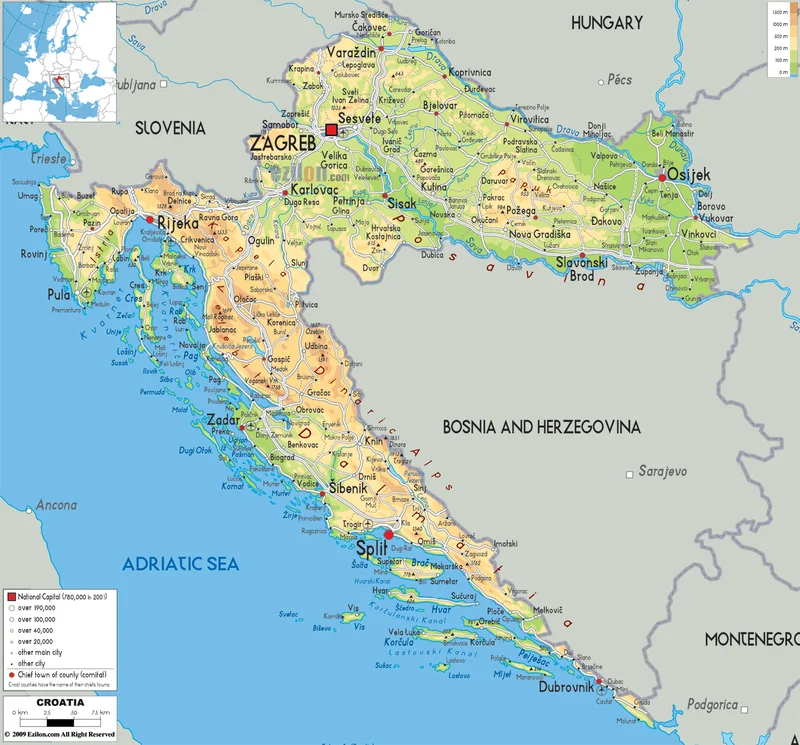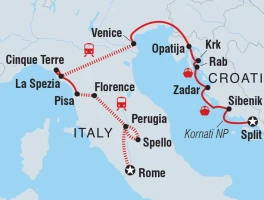Generated Title: United's Grand Tour or Grand Illusion? Why Your Next Vacation is Being Engineered.
So, United Airlines dropped its big Summer 2026 schedule, and the corporate press release, titled United Adds Flights to New Cities in Croatia, Italy, Scotland and Spain next Summer, reads like a breathless travel blogger who just discovered artisanal coffee. They're launching "exclusive" nonstops to "unique, trendsetting destinations" like Split, Croatia; Bari, Italy; and Santiago de Compostela, Spain. Patrick Quayle, a guy with a title longer than a CVS receipt, says they "pride themselves on connecting our customers to unique, trendsetting destinations no other U.S. airline serves."
Let me translate that for you. "Unique" means a place you haven't been over-saturated with on Instagram... yet. "Trendsetting" means they're about to make it a trend by flooding it with American tourists. And that golden phrase, "no other U.S. airline serves," is the real kicker. It doesn't mean they're brave pioneers. It means they've found a market where they can have a monopoly and charge you $1,800 to sit in a glorified Pringles can for nine hours.
This isn't about exploration; it's about arbitrage. It's about finding the last few pockets of Europe that haven't been completely strip-mined for tourist dollars and getting there first. Give me a break.
The Great Algorithm in the Sky
You have to wonder how these decisions get made. Does a bunch of execs in a Chicago boardroom just throw darts at a map? Offcourse not. This whole operation feels less like an airline expanding its routes and more like a tech company deploying a new feature. It all seems so random. No, 'random' is the wrong word—it's calculated to look random, to feel like an authentic discovery.
United isn't a travel company anymore; it's a data company with wings. Think of them as the Netflix of the skies. They see us binge-watching shows about the Dalmatian Coast, they see the search queries for "underrated Italian food," they track the geotags from that one influencer who went on a pilgrimage in Spain. And just like Netflix greenlights another season of some mediocre show you hate-watched, United greenlights a daily flight to Santiago de Compostela on a cramped 737-MAX8. They're not responding to demand; they're predicting it, shaping it, and then profiting from the very wave they created.
What data are they scraping that tells them Split, Croatia is the next big thing? Is it the number of times "Game of Thrones filming locations" has been Googled in the last six months? How many Pinterest boards are titled "Dream Adriatic Wedding"? This ain't about connecting people. It’s about converting our digital daydreams into ancillary revenue and baggage fees. And we, the users, are just nodes in the network, blissfully unaware that the vacation we think we "discovered" was served to us like a targeted ad for shoes we glanced at once.
Manufacturing a Moment
And here's where it gets really weird. The timing of it all is just... perfect. A little too perfect.

Just as United announces its shiny new route to Split, what happens? News breaks that a 1500-year-old olive oil production complex discovered in Croatia has been found right nearby in Salona. The headlines practically write themselves: "Explore Ancient Roman History on Your Croatian Getaway!" A few days later, who's in the news? The Pope, giving a special address to 10,000 Croatian pilgrims, praising their "living faith." And where else is United flying? Santiago de Compostela, the literal endpoint of one of the world's most famous Christian pilgrimages. It feels less like a series of coincidences and more like a brilliantly coordinated, multi-pronged marketing campaign.
It’s like watching a movie studio build hype. First, you leak some set photos (the archaeological dig). Then you get a celebrity endorsement (the Pope). You get some sports coverage to build national pride (Croatia's World Cup qualifier). Then, when the cultural zeitgeist is perfectly primed, you drop the main product (the nonstop flight). They're building the narrative, laying the tracks, and all we have to do is buy the ticket...
Am I saying United coordinated with the Vatican and a team of Croatian archaeologists? Probably not. But does it matter? The effect is the same. The entire media and cultural ecosystem is, intentionally or not, working together to manufacture a "moment" for a destination. It creates a feedback loop: the new flight makes the destination newsworthy, and the news coverage justifies the flight. So when you book that trip, are you really following your own sense of wanderlust, or are you just responding to a very expensive, very subtle advertising campaign for an entire country?
It's just like my friend who works in digital marketing. He doesn't sell products anymore. He "builds communities" and "fosters authentic conversations" that just so happen to lead people to buy a specific brand of overpriced water bottle. Same playbook, bigger scale.
The Monopoly Playbook
Let's circle back to that key phrase: "the only U.S. airline." United is practically screaming it from the rooftops. They are the only one flying nonstop from the US to Split, Bari, Glasgow, and Santiago de Compostela. They're the largest carrier to Israel and Scotland. This isn't a humblebrag; it's a statement of intent.
This strategy is about cornering markets before their rivals even realize they're markets. Why fight Delta over another flight to Paris or London when you can own the entire American tourist pipeline to the Puglia region of Italy? By being the only game in town, they set the terms. They set the prices. They decide which aircraft to use—and if that means a narrow-body jet for a seven-hour flight over the Atlantic, so be it. Customer comfort is a distant second to market dominance.
Look at the new Reykjavik flight from Washington-Dulles. They make a big deal about being the "only airline to offer lie-flat business class seats" between the two capitals. Fantastic. But for the 90% of us flying in the back, it’s just another option on a route that’s already getting crowded. The real prize isn't the lie-flat seat; it's locking down a crucial slot at a major East Coast hub to a perennially popular tourist spot.
Then again, maybe I'm the crazy one here. Maybe this is just good business, a genuine attempt to offer people new experiences. But when I read a press release that uses the word "unmatched" and "leader" that many times, my internal bullshit detector starts making a sound only dogs can hear. It all feels less like a golden age of travel and more like the final consolidation of it.
Just Follow the Algorithm
So, there it is. Your next "authentic", "off-the-beaten-path" vacation has already been A/B tested, focus-grouped, and pre-approved for you by a global logistics corporation. They're not selling flights; they're selling a pre-packaged narrative of discovery. They've found a way to monetize our desperate search for something real in a world that feels increasingly fake. The irony, of course, is that the search itself is now the product. They're telling us where to wander, and we're gratefully paying for the privilege.

